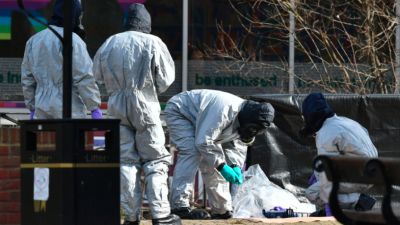The mark Novichok has left on Salisbury four years on from attack

The Salisbury Novichok poisonings have "left a mark" on the city, as the leader of Wiltshire Council says Russia's actions in Ukraine have reminded the community of the painful events which left one woman dead.
Today (March 4) marks four years since a major incident was declared when former Russian spy Sergei Skripal, and his daughter Yulia Skripal, were poisoned with the nerve agent in Salisbury city centre.
The pair were found unconscious by the Maltings shopping centre after being exposed to the agent when it was applied to the door handle of their Wiltshire home.
The UK Government and Scotland Yard believe the Kremlin was responsible.
Wiltshire Detective Sergeant Nick Bailey was the first on the scene at the Skripal's home before the extent of the attack was known, becoming exposed to Novichok himself leading to treatment at Salisbury District Hospital.
In July 2018, Dawn Sturgess from Amesbury died after she and her partner, Charlie Rowley, were exposed to the nerve agent.
Officers believe that the 44-year-old and her partner Charlie, 45, handled a discarded perfume bottle which contained the deadly chemical.
The Metropolitan Police have identified three suspects wanted in connection with the poisonings: Denis Sergeev, Alexander Mishkin and Anatoliy Chepiga, who used the aliases Sergey Fedotov, Alexander Petrov and Ruslan Boshirov respectively while in the UK.
Councillor Richard Clewer says the event was unprecedented for established national governments, and impossible for a local unitary authority to handle alone.
Cllr Richard Clewer speaks to ITV News on Salisbury anniversary
"It was the first use of chemical weapons on European soil since the first world war, there was no one anywhere who was ready to deal with that, no government and particularly not a local authority," the council leader said.
"Where it was extremely difficult was you were suddenly dealing with something where in the course of that first day had clearly become an international incident involving unknown chemical weapons.
"There's no playbook for that, you've got an awful lot of people coming in with an awful lot of views that made it really, really tough."
He also says the pain that had faded from the community is being brought back into focus as a result of the international tension surrounding Russia and Ukraine.
"It had faded away relatively quickly, I'm afraid the situation in Ukraine has brought it right back into people's minds.
"Amesbury went through rough times, I think from my experience of Amesbury they've bounced back and been pretty resilient, but it has left a mark on Salisbury.
"It leaves a mark when you talk to people in the wider world, I think it was dying away but I think it's brought it sharply back to everyone's focus now we've seen Putin and the insanity that's happening in Ukraine following on from the insanity of using chemical weapons in an English city."
The public inquiry into Dawn Sturgess's death was pushed back earlier this week, leading to frustration from the Wiltshire community and loved ones of the victims.
Home Secretary Priti Patel ordered an inquest into Ms Sturgess’s death be converted into a public inquiry to better establish the extent of Russian involvement.
The first hearing of the inquiry happened on Friday 25 February at the Royal Courts of Justice.
At the hearing, coroner Baroness Heather Hallett - who has now been appointed to lead the Covid-19 inquiry - was told her successor had still not been found, resulting in delays.
However some argue that the unfolding humanitarian crisis in Ukraine should be a reason to push forward with the inquiry without further delay.